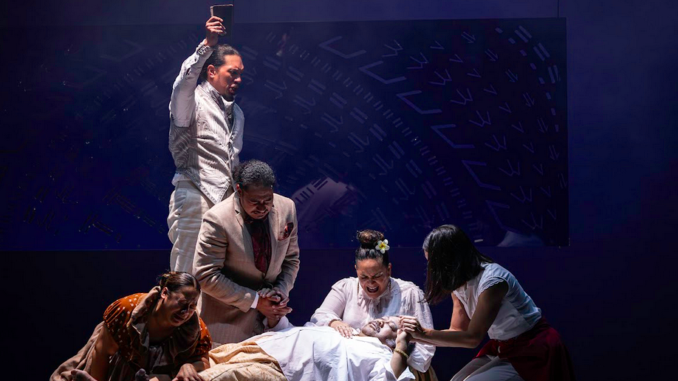
The Road to Leadership is Through Service
As soon as O le Pepelo, le Gaoi, ma le Pala’ai (The Liar, the Thief, and the Coward) starts, the audience is immersed in the Samoan language. The opening monologue by Vaofefe (The Village Vale), played by Jesme Fa’auuga, is recited fully in Samoan — no subtitles provided.
A bilingual production requires a great deal of trust in the audience, especially when asking viewers to embrace language through immersion rather than translation. O le Pepelo, le Gaoi, ma le Pala’ai alongside other recent productions (such as last year’s How to Throw a Chinese Funeral that also utilised long stretches of Cantonese) doesn’t back away from the challenge, exploring how to use more than words to convey meaning.
Because even though I was left to ponder what was being said, I knew exactly what was going on.
Fa’auuga’s performance was brimming with Shakespearean charm. I was able to pick up on the warning and foreboding in Vaofefe’s tone alone, and from the laughter in the audience, there was as much fool’s wit as wisdom in his words.
In true King Lear style, the problem at hand is succession. The health of Chief Pili Sā Tauilevā (Semu Filipo) is failing and he must choose either his son or daughter to succeed him.
It is a quick set up for a tragic arc: the chief’s key flaw is his stubbornness and he refuses to acknowledge his health or an heir. As such his two children (Ana Corbett, and Haanz Fa’avae-Jackson) are left to squabble over their birthright. While all performances were exceptional, Ana Corbett stood out in particular; her haughty attitude is uncalculated and natural as she effortlessly plays the part of the prodigal daughter.
In assessing their worthiness as heir, Pili questions the service and dedication of his two children. Pili recites the Samoan proverb ‘o le ala i le pule o le tautua’ — the road to leadership is through service. I was initially unfamiliar with the Samoan Tautua system, a cultural tradition of service to the family, but the play provides both an education and exploration into the subject. O le Pepelo, le Gaoi, ma le Pala’ai questions what it means to serve and when acts of lies, theft and cowardice are hidden behind acts of service — such as the actions Pili believes he is entitled to make in his service as Chief, and how he manipulates others to serve him.
In typical stylistic choice of ATC, the set was minimal and paired back, reserving props for where they can have the greatest impact. For 2023’s King Lear it was the pristine white walkway that progressively got more dirty throughout the production. In O le Pepelo, le Gaoi, ma le Pala’ai, it is the structure of the house. The three levels of open plan that are constantly telling a story within a story as we look to where characters are standing in relation to the family hierarchy and in relation to each other.
From the top floor of the house, I was readily anticipating the depth to which the chief would fall. The play does an amazing job at laying tension, both from within the family and with the impending backlash from the members of the village. However, at the end I felt the consequences to be only partially realised and was left yearning for more tragedy.
Yet, O le Pepelo, le Gaoi, ma le Pala’ai dares to demand more from the audience and sets a new standard for bilingual theatre in Tamaki Makaurau. Dark and gripping, this domestic drama is a powerful exploration into Samoan culture and language.
O le Pepelo, le Gaoi, ma le Pala’ai plays at ASB Waterfront Theatre from 5th to the 23rd of March 2024.

Leave a Reply